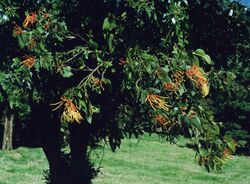Biology:Psittacanthus schiedeanus
| Psittacanthus schiedeanus | |
|---|---|

| |
| Psittacanthus schiedeanus | |
| Scientific classification | |
| Kingdom: | Plantae |
| Clade: | Tracheophytes |
| Clade: | Angiosperms |
| Clade: | Eudicots |
| Order: | Santalales |
| Family: | Loranthaceae |
| Genus: | Psittacanthus |
| Species: | P. schiedeanus
|
| Binomial name | |
| Psittacanthus schiedeanus (Schltdl. & Cham.) G.Don[1]
| |
| Synonyms[1] | |
| |
Psittacanthus schiedeanus (Schltdl. & Cham.) G.Don is a species of Neotropical mistletoe in the family Loranthaceae, which is native to Panamá, Costa Rica, Honduras and Mexico.[1][2]
Description
Psittacanthus schiedeanus is a hemiparasite growing to 1–2 metres (3–7 ft)[3] with quadrangular stems which are flattened at the nodes. The haustorium is large. The bluish-green leaves are asymmetric and about 20 centimetres (8 in) long and 8 centimetres (3 in) wide, with stout petioles and pinnate venation. The inflorescence is terminal. The fruit is a berry.[4]
Hosts
The most common hosts are oaks(Quercus species) and other hardwoods.[4] Other hosts are the conifers: Pinus leiophylla, P. montezumae, P. teocote and P. oocarpa.[4] This species causes significant damage to pine forests used for harvesting wood.[4] However, despite being a damaging parasite of conifers, it is important for medicine and wildlife.[4]
Ecology
Birds are important in the plant's life-cycle. They pollinate it while feeding on the nectar, and when they feed on the fruit they disperse the seeds.[4]
Taxonomy
Psittacanthus schiedeanus was first described by Adelbert von Chamisso and Diederich Franz Leonhard von Schlechtendal 1830 as Loranthus schiedeanus,[5][6] and in 1834, George Don assigned it to the genus Psittacanthus.[7][8]
Etymology
Psittacanthos comes from the Greek psittakos (parrot), and the Greek anthos (flower), possibly chosen, according to Don,[9] because of the bright colours. The epithet, schiedeanus, honours the collector, Christian Julius Wilhelm Schiede, botanist and plant collector in Mexico.[10]
References
- ↑ 1.0 1.1 1.2 Govaerts, R. et al. 2018. "Plants of the World online: Psittacanthus schiedeanus". Board of Trustees of the Royal Botanic Gardens, Kew. https://powo.science.kew.org/taxon/urn:lsid:ipni.org:names:551444-1. Retrieved 20 May 2018.
- ↑ GBIF: Psittacanthus schiedeanus (Schlecht. & Cham.) G.Don GBIF.org (26 May 2018) GBIF Occurrence Download https://doi.org/10.15468/dl.yy1lrj
- ↑ Kuijt, J. 2009. "Monograph of Psittacanthus (Loranthaceae)." Systematic Botany Monographs, vol. 86, pp. 1–361. JSTOR Retrieved 20 June 2018
- ↑ 4.0 4.1 4.2 4.3 4.4 4.5 Geils, B.W., Tovar, J.C., Moody, B. 2002. "Mistletoes of North American Conifers". (Forest Service, U.S. Department of Agriculture, U.S.A., Sanidad Forestal, SEMARNAT, Mexico Canadian Forest Service, Department of Natural Resources Canada Available at https://www.fs.fed.us/rm/pubs/rmrs_gtr098.pdf
- ↑ "IPNI: Loranthus schiedeanus". International Plant Names Index. http://www.ipni.org/ipni/idPlantNameSearch.do?id=550157-1. Retrieved 5 June 2018.
- ↑ von Chamisso, A. & von Schlechtendal, D.F.L. 1830. Linnaea 5: 172. Retrieved 20 June 2018.
- ↑ "IPNI: Psittacanthus schiedeanus". International Plant Names Index. http://www.ipni.org/ipni/idPlantNameSearch.do?id=551444-1. Retrieved 5 June 2018.
- ↑ Don, G. 1834. A general history of the dichlamydeous plants :comprising complete descriptions of the different orders...the whole arranged according to the natural system 3: 418.
- ↑ Don, G. 1834. "A general history of the dichlamydeous plants :comprising complete descriptions of the different orders...the whole arranged according to the natural system 3: 415.". https://biodiversitylibrary.org/page/341991.
- ↑ Quattrocchi, U. 2000."CRC World Dictionary of Plant Names", p.2404, CRC Press. Retrieved 20 June 2018
Further reading
- Buen Lorena, L, Ornelas Juan, F (2002) Host compatibility of the cloud forest mistletoe Psittacanthus schiedeanus (Loranthaceae) in Central Veracruz, Mexico. American Journal of Botany 89, 95–102.
- de Buen, LL, Ornelas, JF (2001) Seed dispersal of the mistletoe Psittacanthus schiedeanus by birds in central Veracruz, Mexico. Biotropica 33, 487–494.
- de Buen, LL, Ornelas, JF (2002) Host compatibility of the cloud forest mistletoe Psittacanthus schiedeanus (Loranthaceae) in central Veracruz, Mexico. American Journal of Botany 89, 95–102.
- Kuijt, J (1967) On the structure and origin of the seedling of Psittacanthus schiedeanus (Loranthaceae). Canadian Journal of Botany 45, 1497–1506.
- López-de Buen, L, Ornelas, JF (1999) Frugivorous birds, host selection and the mistletoe Psittacanthus schiedeanus, in central Veracruz, Mexico. Journal of Tropical Ecology 15, 329–340.
- Ornelas, J, Gándara, E, Vásquez-Aguilar, AA, Ramírez-Barahona, S, Ortiz Rodriguez, A, González, C, Teresa Mejía Saules, M, Ruiz‐Sanchez, E (2016) 'A mistletoe tale: Postglacial invasion of Psittacanthus schiedeanus (Loranthaceae) to Mesoamerican cloud forests revealed by molecular data and species distribution modeling.'
- Ramírez, MM, Ornelas, JF (2010) Polinización y producción de néctar de Psittacanthus schiedeanus (Loranthaceae) en el centro de Veracruz, México. Boletín de la Sociedad Botánica de México 61–67.
- Ramírez, MM, Ornelas, JF (2012) Cross-infection experiments of Psittacanthus schiedeanus: Effects of host provenance, gut passage, and host fate on mistletoe seedling survival. Plant disease 96, 780–787.
Wikidata ☰ {{{from}}} entry
 |

